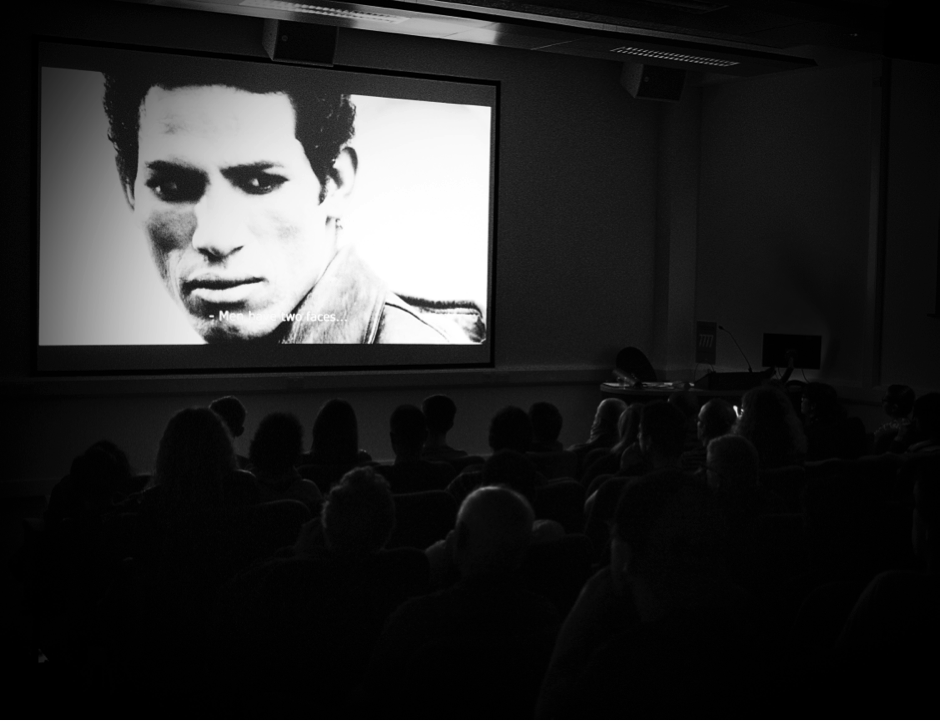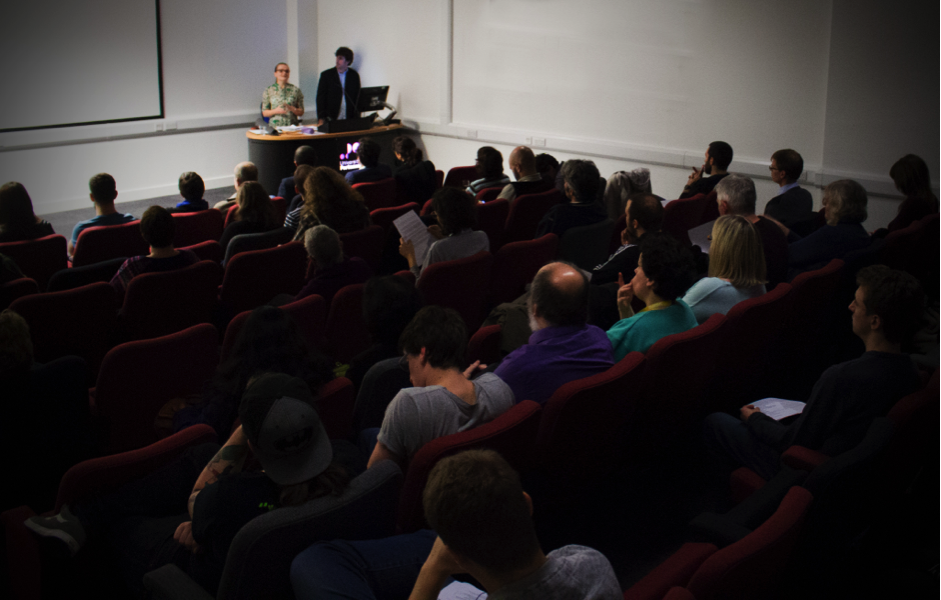In this post, Kelsey Suggitt (@Kelseysailing) reviews the film screening and panel discussion of the highly acclaimed, The Battle of Algiers, which took place at the University of Portsmouth on Wednesday 19th November, as part of the Being Human festival, a national event that aims to bring humanities to the public, and in collaboration with Portsmouth Film Society and Film Hub South East.
The evening began with an introduction to the panel by Dr Deborah Shaw (Associate Dean, (Research), Faculty of Creative and Cultural Industries) and an introduction to the film by Dr. Natalya Vince (Senior Lecturer in French and North African Studies, Faculty of Humanities and Social Sciences).
Gillo Pontecorvo’s The Battle of Algiers was released in 1966 and is today considered to be one of the most influential films in history. Working alongside the Italian director as a co-producer and actor, was Yacef Saadi who played a key role both in the FLN (National Liberation Front) and in the film. Set during the Algerian War of Independence, a war that was fought on several fronts, the Battle of Algiers takes place in a very short, yet important, period, when Algeria arguably had its heaviest impact on the international conscience. The film recounts what is described as the “Battle of Algiers”. Yet, although this phrase continues to be used more than fifty years later, it is problematic because a battle implies two equal sides rather than unequal opponents, as in this case, where the might of the French army stood against a relatively small group of urban guerrillas.
 © Alan Grant
© Alan Grant
The Battle of Algiers initially experienced limited success, with a muted reception in France, where limited screenings were subject to right-wing attacks, and a wary acceptance in Algeria where, according to Vince, many claimed that “it was not bad, but not a masterpiece”. Despite this, it won the Golden Lion at the Venice Film Festival in 1966 and was even nominated for three Academy Awards in non-consecutive years.
Following the screening of the film, which, as the credits rolled, prompted a round of applause from the audience, Natalya Vince introduced the panel which was comprised of Neelam Srivastava (Senior Lecturer in Post-Colonial Literature at Newcastle University) who interviewed Pontecorvo before his death and has published a number of articles on his work, Walid Benkhaled (Production Manager of the School of Media and Performing Arts, University of Portsmouth, and co-author, with Natalya Vince, on a forthcoming volume on Algeria) and Martin Evans (Professor of Modern European History at the University of Sussex and the author of Algeria: France’s Undeclared War).
Srivastava opened the panel by contextualising the film, which she describes as “classic anti-colonial cinema”. She placed particular emphasis on how the film was produced during a period of economic boom and intense anti-fascism in Italy, and how this is reflected within The Battle of Algiers, particularly the depictions of analogies of Italian resistance. Pontecorvo also uses violence throughout the film and was clearly influenced by Frantz Fanon since the film draws on the ethics of political violence. This is highlighted in the film through the character Ben M’Hidi, who states that terrorism does not wins revolutions, but it is the first step to achieving revolutionary change. Srivastava also highlighted how Italy was beyond its colonial days by the time of the Algerian War, and supported the FLN’s desire to liberate their country, evidenced by young Italians voicing staunchly anti-colonialist views and the release of books such as Henri Alleg’s La Question. This, in turn, led public opinion in Italy to shift against the French. Pontecorvo had long desired to make a film about the ongoing war. He even visited Algeria prior to 1962 and spent time in the Kasbah and with members of the FLN. With the documentation he collected he began to film Paras, a project that eventually fell through. Pontecorvo was then approached by Yacef Saadi, who had previously contacted other left wing Italian directors with a script he had written based on his Memoirs de la Bataille d’Alger. Although the script was markedly altered by Pontecorvo, this began the partnership that would lead to The Battle of Algiers.
Following Neema Srivastava’s paper, Walid Benkhaled spoke not only of the history of the film and its context within Algerian history, but also his own personal connection to the film, emphasising especially how, in spite of more than 60 viewings, it still provoked strong emotion in him. Benkhaled also underlined the importance of the film for a newly independent Algeria and the opportunities provided by countries, such as Italy, though its co-productions. He also praised the aesthetics of the film and the techniques used, such as using a 16mm frame to create a grainy effect and a hand held camera with a photo lens, which create a “tone of truth” and lead some viewers to wonder if the film is in fact fiction and not a documentary. It is for these reasons, and others, that The Battle of Algiers has become not just a representation of history, but a historical document itself in memory of the war.
Martin Evans concluded the panel by analysing the trans-national history of the film. One example he gave is the character of Ali la Pointe, an illiterate revolutionary from a modest background, who has been represented as a hero of the revolution, contributing to raising the profile of heroic proletariat revolutionaries, a character that has been appealing for workers across the world since the 1920s. Evans’ work has begun to map the impact of this film across the world during the five decades since its release. This is a film that has had a marked impact on multiple filmmakers including Paul Greengrass, Spike Lee, Ken Loach, Mira Nair, Steven Soderbergh, Oliver Stone and Quentin Tarantino. Evans also emphasised the importance of the film as an icon of counter-culture canon, as it has been used by multiple insurgent groups including the IRA and the Black Panthers, and also lit up Algeria as a beacon of anti-colonialism. The film also speaks to subsequent generations, particularly post 9/11, and influences how we view terrorism today. This is repeatedly underlined by various parties who use the film for their own purposes, from its screening at the Pentagon in 2003 to demonstrate how to conduct a war amongst the people but also how to win their hearts and minds, to its screening for the Algerian football team in 2010 in an attempt to inspire a win in their World Cup match.
 © Alan Grant
© Alan Grant
This was a great event and which shed new light on the context in which Pontecorvo produced the film, and also its trans-national nature of its memory and impact which can be traced through the years.
From a personal perspective, although I have watched The Battle of Algiers many times over the past six years, I learnt many new things about the film from the panel. I would like to express my gratitude, therefore, to the panel for their time and their new perspectives on this well-known film. I would also like to take this opportunity to thank the organisers for putting together this brilliant event.
The Being Human festival continues at Portsmouth with the Story of Revolutions Exhibition by Patrick Altès (until 26th November 2014).
